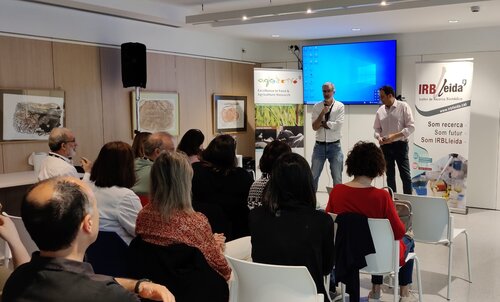Agrotecnio and IRBLleida jointly promote three new biomedical research projects
They address the prevention of colonorectal cancer by eating barley-rich foods, the use of rice seed extracts to inhibit infectious diseases and research into systems to improve beta-carotene absorption
The two CERCA centres in the city of Lleida, Agrotecnio and the Institute of Biomedical Research of Lleida (IRBLleida), are joining forces once again to promote 3 biomedical research projects thanks to the second call for research projects in Agriculture, Food, Nutrition and Health: AgroHealth 2024.
AgroHealth is an innovative initiative within the framework of the network of Research Centres of Catalonia (iCERCA), through which Agrotecnio and IRBLleida combine their research capacity to develop collaborative projects that combine agri-food with biomedical research in favour of improving health and well-being.
The 2024 call comes after the success of the first call in 2022, which also funded 3 projects. This year's call has an overall budget of €135,000, provided by the centres themselves. Three new projects have been selected that address the prevention of colonorectal cancer through the intake of barley-rich foods, the use of rice seed extracts to inhibit infectious diseases and the study of systems to improve the absorption of beta-carotene, which has been shown to be a potent antitumour agent. Each of the projects will receive €45,000.
Each project involves a research group from Agrotecnio and another from IRBLleida, with the aim of maintaining the collaboration after the end of the project. The AgroHealth call is biannual, and aims to create lasting synergies between researchers at the two centres, so that these same projects can later be submitted to more ambitious national or international calls for proposals. To be eligible to participate in the AgroHealth call for proposals, researchers must hold a doctorate, have a scientific or technical background consistent with the proposed project and be attached to Agrotecnio or IRBLleida.
Barley as a preventive of colorectal cancer
The project 'Efectes quimiopreventius dels aliments amb base d'ordi rics en compostos bioactius en el càncer colorrectal (CHEMBAR)' is promoted by the researchers Laura Rubió (Agrotecnio- Universitat de Lleida) and Diego Arango del Corro (IRBLleida).
In recent years, Agrotecnio's Crop Physiology group has developed new barley biofortified with β-glucans and polyphenols for human consumption. Preliminary studies in animal models have indicated that these β-glucans and polyphenols attenuate inflammation and modulate the gut microbiota in a beneficial way.
This modulation may play a crucial role in preventing colorectal cancer, improving gut health and reducing inflammation, inhibiting tumour development and progression.
The project proposes an interdisciplinary approach to assess the chemopreventive effects of foods made with biofortified barley on this type of cancer. The aim is to study how bioactive compounds in barley are metabolised using in vitro digestion models, before applying them in biological models. The impact of barley digests on colon cancer cells and intestinal organoids will be evaluated, as well as the preventive effects in a mouse model of colorectal cancer. The project integrates advanced genetic, biochemical and nutritional methodologies in in vitro and preclinical models.
Natural microbicides from rice against infectious diseases
The project 'Natural microbicides from rice against current and emerging infectious diseases' is led by Paul Cristou (Agrotecnio - UdL) and Manel Portero (IRBLleida - Universitat de Lleida).
Agrotechnology has recently demonstrated that certain rice extracts inhibit the infection of two unrelated viral trunks (HIV and SARS-CoV-2), a fact that indicates the possible presence of proteins with broad-spectrum antiviral properties, at this stage unknown. To advance this knowledge, a combination of fractionation and affinity capture techniques will be used to identify them.
The neutralising capacity (on pseudoviral particles and live viruses) of rice seed-derived components, affinity-captured with immobilised viral surface proteins, as well as simple protein mixtures generated by fractionation from plant extracts, will also be explored.
The proteins, complexes and fractions with antiviral activity will be analysed by mass spectrometry to identify the constituents by comparison with existing *proteinomic data. Finally, large-scale purification of these proteins will be optimised to facilitate the development of effective microbicides against current and future pandemic diseases.
Carotenoids as anti-tumour agents
The project 'Disseny dirigit de sistemes d'administració nanoestructurats comestibles que contenen betacarotè com estratègia de suplementació dietètica amb activitat antitumoral', directed by Laura Salvia (Agrotecnio - Universitat de Lleida) and Nuria Eritja (*RBLleida - Universitat de Lleida), is based on the study of carotenoids, lipophilic bioactives present in fruits and vegetables with antioxidant activity and which have potential beneficial effects against cancer. However, carotenoids have very low absorption when consumed in their natural form. Therefore, new strategies are needed to improve their absorption.
Delivery systems based on nanostructured lipids in the form of nanoemulsions, hydrogels or oleogels have been shown to improve the bioavailability of carotenoids due to their high active surface area. In this context, the project aims to study the effect of release systems based on nanostructured lipids containing β-carotene as a method of dietary supplementation in various types of cancer, using in vitro and in vivo approaches to formulate enriched foods with potential anti-tumour effect.
Text: Agrotecnio

Launch of the second call for AgroHealth in 2024






